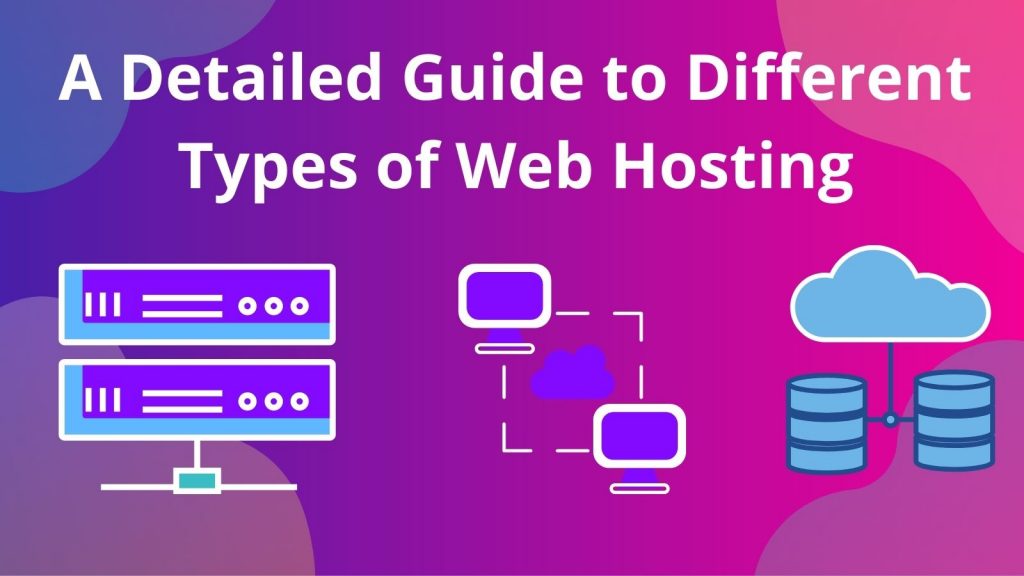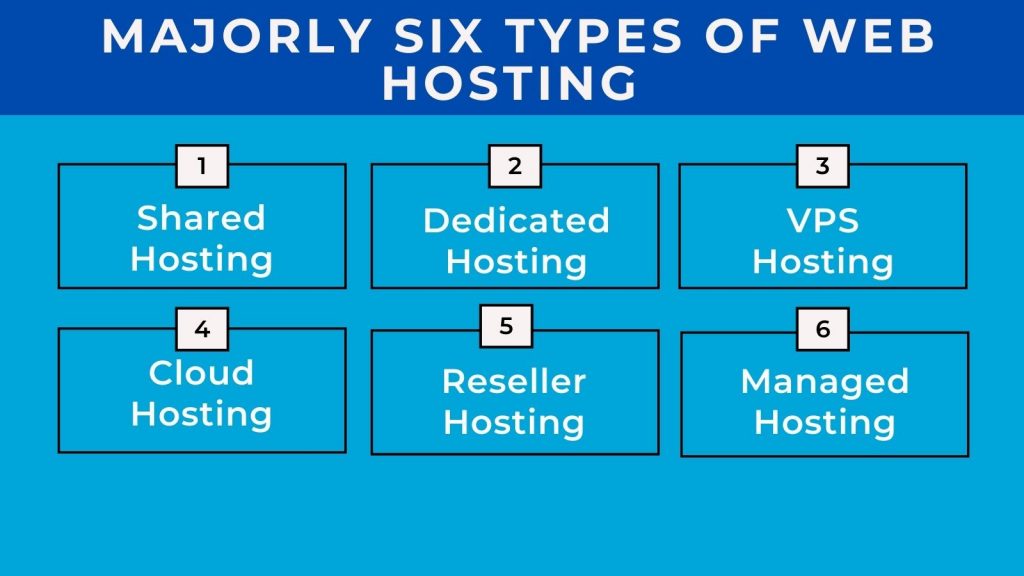
What is Web Hosting?
Allocating space on a physical server to store the code, images, data, etc. of your website is known as web hosting. Now, how do you interact with the server space will depend on the requirements of your website and will decide on what type of hosting will be optimum for you.

There are majorly six types of Web Hosting -:
#1
Shared Hosting:
The physical server space that hosts the websites is shared among multiple users. For small businesses that don’t anticipate high traffic and are tight with their budget, this is the perfect plan.
Pros-:
- Economical as compared to other plans
- Easy to set up
- Don’t require any technical skills to maintain, good for a novice person
- Ideal for enterprises in the beginning
Cons-:
- No room for scalability
- Compromise on security as you are vulnerable to attacks on others
- Performance issues as resources are shared
Ideal For: Small scale business, personal blogs, side projects, etc.
#2
Dedicated Hosting:
The physical server space completely belongs to your website. This plan weighs heavy on the pocket but is recommended for large business enterprises. A Dedicated facility leaves enough room for specific customization and a large bandwidth to deliver high performance.
Pros-:
- You have exclusive control over Hardware Resources
- Enhanced Security as there is no sharing
- Can run heavy programs and processing
- Large scope for Customization to suit your changing needs
- Better support and service from Hosting Provider as you are a big customer
Cons-:
- Expensive as compared to other plans
- Need technical expertise to handle and maintain the server
Ideal for: Large Corporations with confidential financial data, Gaming companies, Streaming platforms, Software companies with heavy algorithms
#3
VPS Hosting:
The term VPS refers to Virtual Private Server. It’s an upgrade over the Shared Hosting plan. The server capacities are divided among the different users to give them individual space with each having its own copy of the Operating System. There is flexibility to modify the specifications as per the business needs change with time, even then, it is cheaper than a server completely dedicated to a single user.
Pros-:
- Guarantee of resources as you get your own space
- Easy scalability as it gets easier to increase capacity or vice versa.
- Customization is available on what structure of a plan you need
Cons-:
- Need to have technical skill yourself or hire someone else to manage for you
- Security is better than a Shared server but still vulnerable as sharing the same physical hardware.
Ideal for: Medium Scale Enterprises, websites with a lot of media.
#4
Cloud Hosting:
Cloud hosting is a network that spreads your website code, data to multiple remote physical servers which then acts as coordinated single server space.
This allows easy & quick addition or removal of the dedicated resources for the website as per demand which helps to optimize the budget. Since data is stored in multiple locations, it results in less vulnerability to any technical issue arising at one place and the site keeps running.
Pros-:
- Good for sites with variable traffic.
- Economical costing for any growing medium enterprise.
- No latency issues as the site are hosted at multiple locations.
- Easy Scalability as you can increase or decrease bandwidth, memory, RAM, etc. without much hassle
Cons-:
- Less security compared to Dedicated Hosting as data is stored in multiple locations.
- Dependency on Hosting Provider for technical support as Cloud Hosting can’t be done in-house.
- Less control and flexibility in Cloud Hosting as a lot depends on the Hosting provider
Ideal For: Websites with varying degrees of traffic, and websites with high growth potential.
Also read, A Brief Guide to Understand Dedicated Server Hosting
#5
Reseller Hosting:
As the name suggests, Reseller Hosting is a model where an enterprise or an individual buys Hosting Space from a service and then further rents it to another 3rd party with added margin.
The reseller provides an individual cPanel Hosting account to the end-users and manages their billings, permissions, plans, etc. by a tool called WHMCS which refers to ‘Web Host Manager Complete Solution. This is used for web designers who want to provide a hosting platform to their clients and get additional business
Pros-:
- The opportunity of branding for Reseller as all products are white-labeled and only the reseller name appears to the 3rd party on all systems and documentations
- Low Investment for Reseller as he doesn’t have to invest in hardware himself
- All server maintenance is conducted by the Hosting provider thus Reseller can focus on growth
- Reseller can offer customized add-on plans as required by the customer
Cons– :
- High dependency on original hosting provider. You are the one facing the customer if anything goes wrong at the back-end
- Migration to a different server is very cumbersome
Ideal For: Entrepreneurs wanting to enter the web hosting business, Web Designers
#6
Managed Hosting:
A lot of the above plans can also be bought in a package where everything is managed by the Hosting Provider. E.g. Managed VPS Hosting. Such plans then come under the umbrella of Managed Hosting.
Pros-:
- No technical knowledge is needed as everything is managed by the Hosting Provider.
- High security as the Hosting Provider will have a dedicated team to manage everything
- Time for growth as you can focus on other aspects of business
Cons-:
- It will cost more compared to an unmanaged plan
- Less room for customization as you are not in complete control of the server
Ideal for: Medium/Large businesses that have the budget to outsource technical work and want to focus on growth
Conclusion
In the end, there is no correct or incorrect choice; the decision on what server plan or which Web Hosting suits you best comes down to a cost-benefit analysis that will vary from case to case.
It will be great for you if you already have an honest realization of what amount of traffic & what quality of traffic you expect, the customer base you will have, what kind of data will be on the site, the confidentiality and level of security of will need, the flexibility of altering and customizing the website you will need, the amount of support you will need.
This will not only help you but will also help your Web Hosting provider in recommending you the optimum plan and allow them to serve you in a better way.
 Register
Register

